How Could the Clergymen Make the Us Right Again
(RNS) — When the Rev. Kira Austin-Young, an Episcopal priest in Nashville, Tennessee, heard that the Supreme Court may overturn Roe v. Wade, she began thinking virtually her congregation. She also began doing the math, figuring the fourth dimension it takes to bulldoze to southern Illinois, where abortion will likely remain legal if Roe falls.
"As the pastor of a community, that is what I am thinking about — if someone in my congregation is in need of an ballgame, how exercise I help them?" said Austin-Young, priest-in-charge at St. Ann'south Episcopal Church.
For clergy who support abortion rights in states similar Tennessee, which has already passed a so-called trigger law that would make having an abortion a felony if Roe is overturned, the leak of Justice Samuel Alito's draft Supreme Court majority opinion is already putting their religious convictions at test. While they want to respect state police, they also believe their faith requires them to support access to ballgame.
"If 1 in 4 women have had an abortion, then people who have had abortions are in the pews on Sunday mornings," she said. "How do we as pro-pick clergy make sure people in need are getting safe ones and not being taken advantage of?"
In Texas, where a restrictive abortion measure known as SB8 has been in force since September, Rabbi Kelly Levy said she has already been helping women traveling out of land for abortions after six weeks of pregnancy, the limit imposed by SB8, which comes before most people know they are pregnant.
"For thousands of years, Jews have supported medical access to ballgame for any individual who finds themselves pregnant," said Levy, an associate rabbi at Congregation Beth Israel in Austin. "It is something our ancient text requires. To take away this lifesaving medical procedure away from individuals is going against my religious liberty."
Five years ago, the Rev. Daniel Kanter, senior government minister of First Unitarian Church of Dallas, founded a multifaith chaplaincy group that serves the Southwestern Women's Surgery Center, a Dallas abortion clinic. Since SB8 passed, the group's members commonly back-trail pregnant people to get abortions in neighboring New United mexican states. Texas' trigger law, according to The Texas Tribune, would make performing ballgame a felony and force the Dallas clinic to close. "They're going to accept to detect us through other channels," Kanter said.
But Kanter said the clergy will continue to help people get safe and legal abortions in New United mexican states. "Goose egg well-nigh this police force makes it illegal to help someone become an abortion in some other state," he said.
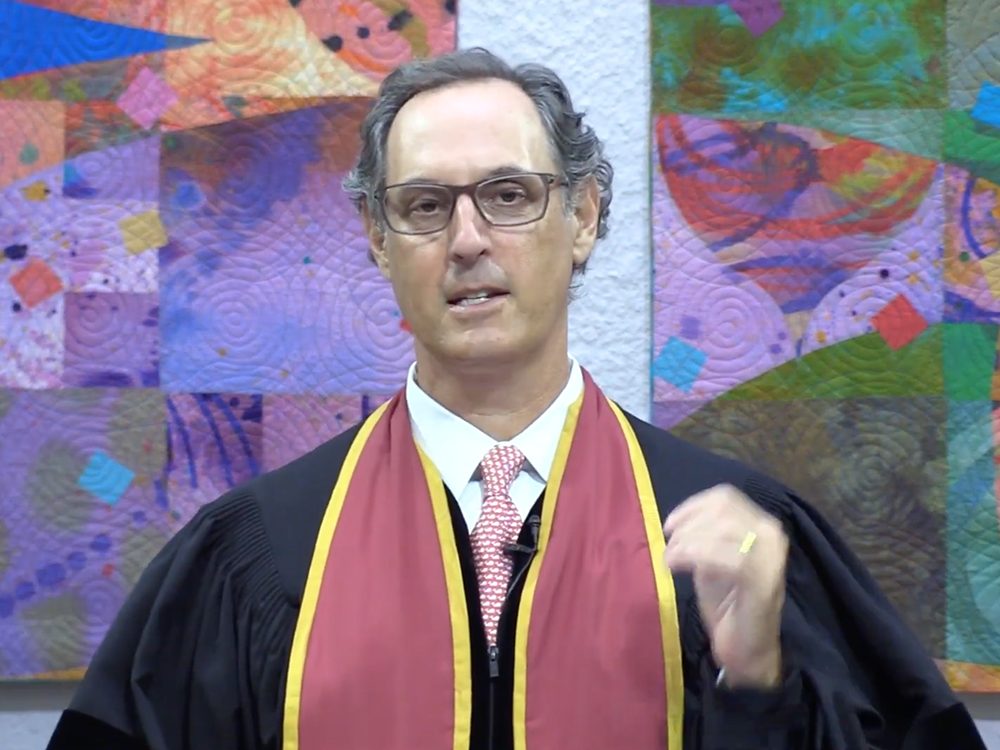
The Rev. Daniel Kanter delivers a sermon on July 4, 2021. Video screen take hold of
Offset Unitarian of Dallas has a long history of making abortion rights a priority. The church'due south Women's Alliance was an early supporter of Roe five. Wade, which originated in the Texas court system. Cecile Richards, later on president of the Planned Parenthood Federation of America, was raised in the church, Kanter said.
"My faith as a Unitarian Universalist says that every person has dignity and worth, and that no ane should exist condemned for their actions or relegated to not being able to make decisions about their bodily autonomy," said Kanter, who provides pastoral intendance and individual counseling to women as they make decisions about abortions.
RELATED: In Texas, 'Reproductive Freedom Congregations' catch on as new abortion law looms
If Roe is indeed overturned, Kanter envisions an emerging "progressive move of reproductive dignity," which includes religious people.
"We saw the rise of this result in evangelicalism with the goal of gaining political power, and we're going to encounter the rise of progressive faith communities around this issue," Kanter said. "Not with the goal of political power, per se, just with the goal of helping real people and real lives."
The Rev. Amelia Fulbright, pastor at the Congregational Church building of Austin, has provided chaplaincy back up for women grappling with whether to proceed with their pregnancies. She said she fears the legal consequences of doing so may be greater if Roe is overturned.
Every bit a faith leader Fulbright said her "role is always to assistance the person get clear about what the options are, and and so to mind to their own moral conscience."
"That to me is like my moral ethical imperative to practise that, regardless of what the law is," Fulbright said.
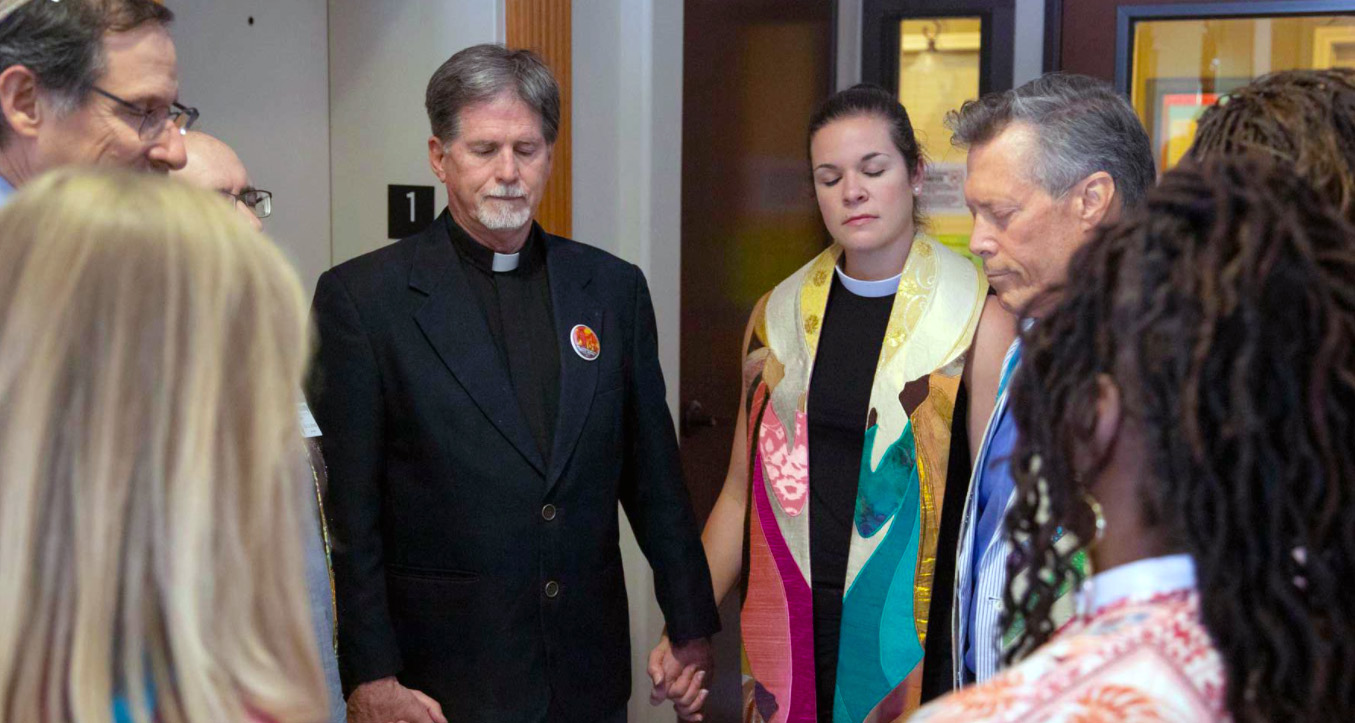
Clergy members hold easily during the approval of a Whole Woman's Health clinic in Austin, Texas. Photograph courtesy of But Texas
If Roe is overturned, said the Rev. Katey Zeh, CEO of the Religious Coalition for Reproductive Choice, it may atomic number 82 to a reboot of groups such equally the Clergy Consultation Service, begun past Christian and Jewish clergy in the late 1960s to help women observe prophylactic abortions. The network was fabricated up of pastors in 38 states, said Zeh, and helped as many every bit one-half a million women.
Those clergy often had the support of their churches and denominations. "It was seen every bit a public heath good — equally people were dying of dangerous abortions at the time," she said. "And in that location was a lot of support for legal abortion."
Merely today proposed restrictions to ballgame could punish ballgame providers, those who have abortions and — in Texas and other states where "copycat" legislation like to SB8 is beingness considered — even someone who accompanies a person to an abortion date.
Last month, a 26-year-old Texas woman was arrested and charged with "the death of an individual past cocky-induced ballgame." Those charges were later on dropped after public outcry.
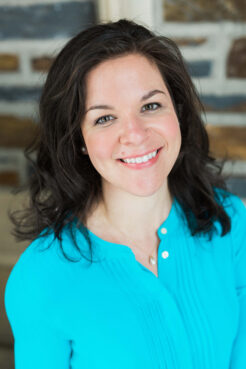
The Rev. Katey Zeh. Courtesy photo
"It's almost like the loss of whatever pregnancy becomes suspicious now, and I call back that that's a real trouble," said Zeh.
Zeh would like to see pastors who support ballgame rights push for the passage of what's known as the Women's Health Protection Human activity, a proposed federal measure that would protect abortion rights. She also believes those clergy should work harder to brand a connection between organized religion and ballgame rights and reduce what she called the stigma of abortion.
"Ultimately, this is virtually trusting people who are pregnant who need to brand a reproductive decision, that they are allowed to express their moral conscience about what they should do with their ain bodies, rather than legislating that on their behalf," she said.
RELATED:Overturning Roe v. Wade inches us dorsum toward the arc of justice
Carolyn Davis, a Washington, DC-based faith advancement strategistworking on reproductive wellness, said activists are likewise working with state legislators to protect admission to ballgame.
Nigh Americans — and many religious people — support keeping abortion legal, only few legislators seem to be aware of the fact, said Davis.
She pointed to information from the Public Religion Research Constitute, showing that most ii-thirds of Americans believe abortion should be legal. That includes 59% of Catholics, 70% of mainline Protestants, 59% of white Catholics, 57% of Hispanic Catholics and 80% of Americans from non-Christian religions. Only xxx% of white evangelicals say abortion should be legal.
According to March 2022 PRRI data, 28% of Americans say abortion should be legal in all circumstances. Simply 9% say abortion should be illegal in all circumstances, down from fifteen% in 2018.
Davis sees abortion in the context of growing fiscal inequality in the U.s., where, she said, many pregnant women feel they practice non have enough support or resources to back up a child. "What does it hateful to make certain anybody can be good for you and have intendance of their families in the way that they need to?"
On the other side of the debate, religious leaders have expressed cautious optimism that the draft opinion spells the terminate of Roe. But Brent Leatherwood, acting president of the Southern Baptist Convention's Ethics and Religious Freedom Commission, said that even if Roe is overturned, there is still more work to be done.
Leatherwood said he would similar to see a "correct to life" enshrined in federal law, something he believes the U.Southward. Constitution would support. He likewise believes opponents of abortion will have to turn their attending to land legislatures, where the battle over abortion would be focused post-Roe. While Bible Belt states would probable ban abortion or significantly restrict it, other activists would push for more incremental change in states such as California and New York.
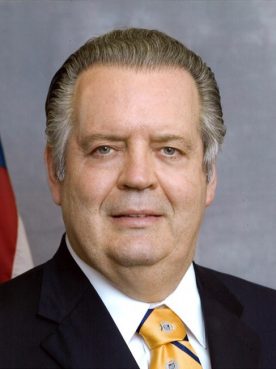
Richard Land in 2011. Photograph courtesy of Creative Eatables
Leatherwood too pointed to the larger issue of providing support for women who are pregnant and struggling. He believes that churches need to pace up and assistance. "We need a model of support so that a mother can say, 'I cull life,'" he said. "There'south a unique role that churches tin can play in this."
Richard Country, a longtime evangelical ethicist and one-time caput of the ERLC, said he was ecstatic to hear the news that Roe may be overturned.
"I have been working onthis since 1973," he said.
Land agrees that more than piece of work will be needed at the state level. He likewise said that both churches and the federal regime should practise more than to support families — extending the child tax credit and offering increased deductions for dependents.
"The virtually important thing a citizen tin can exercise is create a stable family," he said. "We should exercise everything we tin as a order to do that."
RELATED: With Roe teetering, religious activists on both sides flock to the Supreme Court
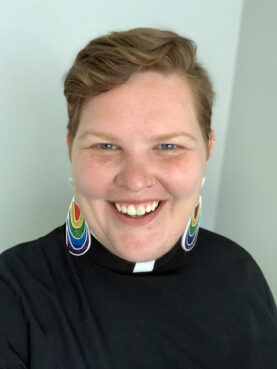
The Rev. Angela Williams. Courtesy photograph
The Rev. Angela Williams, lead organizer for the Spiritual Brotherhood of Communities for Reproductive Nobility, or SACReD, believes religious organizations have a much more expansive role to play than supporting legislation. The Arkansas Presbyterian pastor said religious people have helped to create a stigma around "our sexualities and reproductive lives." She sees information technology every bit her duty to "undo some of the harm that is washed in the proper name of my religion," and she wants others to take activeness besides.
SACReD recently launched a new training program that allows houses of worship to receive a designation from the group that shows the congregation affirms that "reproduction is a sacred responsibility, and prayerful decisions to have children, to not have children, or to end a pregnancy can be as moral."
Houses of faith would provide pastoral intendance, counseling those who have given nascence or had an abortion and helping them with meals. Congregations would also commit to existence politically involved in reproductive rights efforts.
Williams said SACReD has worked with clergy and others from more than 30 religious traditions and denominations in both blueish and cerise states beyond the state in these practices. This includes many who are Unitarian Universalist, rabbis, Muslim leaders, Buddhist and Hindu people, every bit well every bit those who are Presbyterian, Methodist, Episcopalian and Catholic.
"It is the piece of work of all communities, simply in particular Christian communities, to tackle some of the harm that is done in the name of Christianity," Williams said.
Source: https://religionnews.com/2022/05/04/for-red-state-clergy-who-back-abortion-rights-losing-roe-is-a-call-to-action/
0 Response to "How Could the Clergymen Make the Us Right Again"
Post a Comment